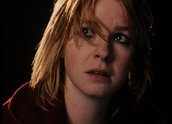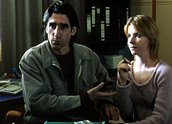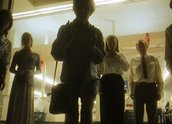


Angel Baby (1995)
Synopsis
Harry (John Lynch) falls instantly for Kate (Jacqueline McKenzie) when he sees her at the mental health clinic. She doesn’t hang around with psychos, she tells him, but her feelings change when she receives a sign from her favourite television show, Wheel of Fortune. Kate believes the clues on the show are messages from Astral, her guardian angel. She and Harry decide to move in together, despite the reservations of Harry’s protective brother Morris (Colin Friels) and his wife Louise (Deborra-Lee Furness). Harry gets a job in a computer firm, they set up house and Kate becomes pregnant. When he decides they should both go off their medications, the results are disastrous, with both ending up back in hospital. Harry re-stabilises himself, then rescues Kate from the mental ward. They hide in a tall building site and wait for their baby – called Astral – to enter the world.
Curator’s notes
Depictions of mental illness are not uncommon in Australian cinema, going back at least as far as the 1930s, when some of Ken Hall’s yokel characters come perilously close to fitting that description. In the modern era, films like 27A (1974), Bliss (1985), Cosi (1996), Romulus My Father (2007), Shine (1996), Sweetie (1989), Tom White (2004), Malcolm (1986) and Praise (1998) have all treated the subject with some seriousness, but none is quite like Angel Baby, the debut of Melbourne-born, US-trained writer-director Michael Rymer.
Angel Baby is both a moving love story and a terrifying glimpse inside the symptoms of what appears to be schizophrenia. It’s made with great empathy but not pity. The difference is perhaps in the way Rymer balances the sense of reality. For much of the first half of the film, Harry and Kate are relatively well, taking their medication and functioning at a high level. Their growing sense of love fortifies them against their fears and gives them a sense of optimism. Some of their views on the ways of the world are eccentric, but no more than that. In the second half of the film, everything crumbles following Harry’s decision that they should both go off medication, so that their baby can be born drug free. Such is the strength of the characterisation, and Harry’s newfound belief in himself and Kate, that we go with him in this decision. We want them to make it through on love and hope alone. When they fail, we feel their devastation.
Many depictions of mental illness never get inside the sense of the struggle, concentrating more on the external signs. Angel Baby makes the illness one factor, not the only factor, in these two lives. Their love story becomes just as strong as the story of their illnesses. In a sense the film works so well because we don’t see them merely as sick people. In that context, there’s a kind of heroism in their desire to have some control over their lives and capacity for happiness.
- Overview
- Curator’s notes
- Video 3 clips
- Principal credits
- Find a copy
- Make a comment
- Map
- Add your review



